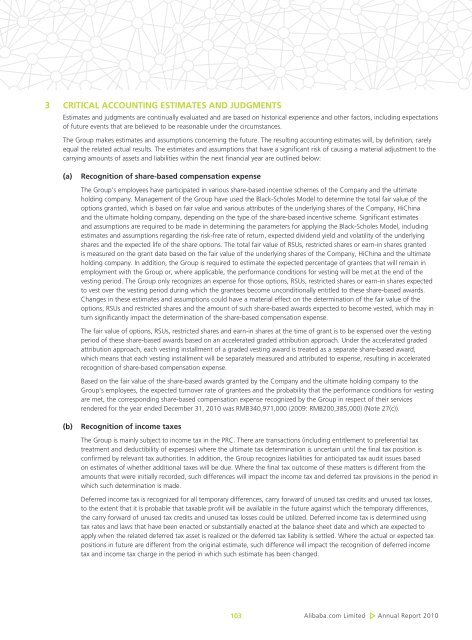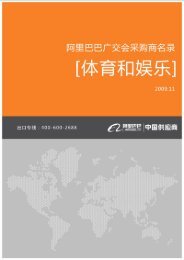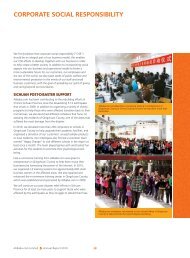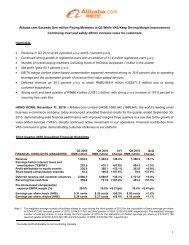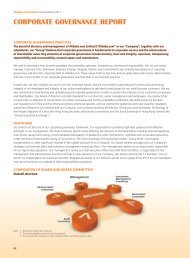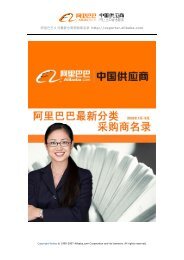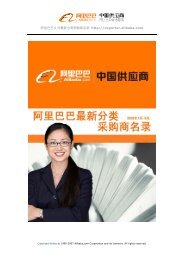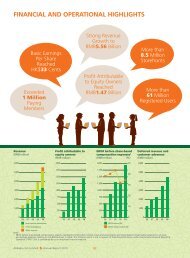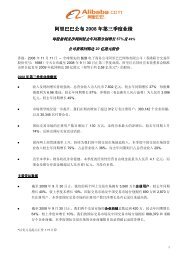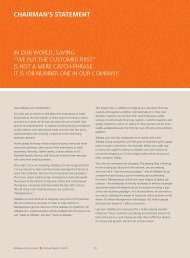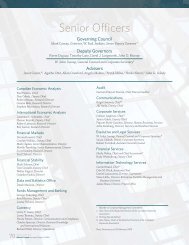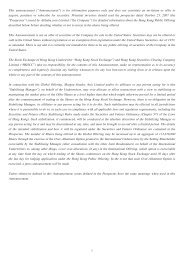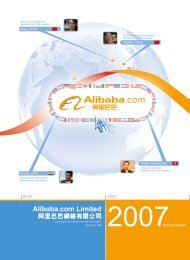You also want an ePaper? Increase the reach of your titles
YUMPU automatically turns print PDFs into web optimized ePapers that Google loves.
3 CRITICAL ACCOUNTING ESTIMATES AND JUDGMENTS<br />
Estimates and judgments are continually evaluated and are based on historical experience and other factors, including expectations<br />
of future events that are believed to be reasonable under the circumstances.<br />
The Group makes estimates and assumptions concerning the future. The resulting accounting estimates will, by definition, rarely<br />
equal the related actual results. The estimates and assumptions that have a significant risk of causing a material adjustment to the<br />
carrying amounts of assets and liabilities within the next financial year are outlined below:<br />
(a) Recognition of share-based compensation expense<br />
The Group’s employees have participated in various share-based incentive schemes of the Company and the ultimate<br />
holding company. Management of the Group have used the Black-Scholes Model to determine the total fair value of the<br />
options granted, which is based on fair value and various attributes of the underlying shares of the Company, HiChina<br />
and the ultimate holding company, depending on the type of the share-based incentive scheme. Significant estimates<br />
and assumptions are required to be made in determining the parameters for applying the Black-Scholes Model, including<br />
estimates and assumptions regarding the risk-free rate of return, expected dividend yield and volatility of the underlying<br />
shares and the expected life of the share options. The total fair value of RSUs, restricted shares or earn-in shares granted<br />
is measured on the grant date based on the fair value of the underlying shares of the Company, HiChina and the ultimate<br />
holding company. In addition, the Group is required to estimate the expected percentage of grantees that will remain in<br />
employment with the Group or, where applicable, the performance conditions for vesting will be met at the end of the<br />
vesting period. The Group only recognizes an expense for those options, RSUs, restricted shares or earn-in shares expected<br />
to vest over the vesting period during which the grantees become unconditionally entitled to these share-based awards.<br />
Changes in these estimates and assumptions could have a material effect on the determination of the fair value of the<br />
options, RSUs and restricted shares and the amount of such share-based awards expected to become vested, which may in<br />
turn significantly impact the determination of the share-based compensation expense.<br />
The fair value of options, RSUs, restricted shares and earn-in shares at the time of grant is to be expensed over the vesting<br />
period of these share-based awards based on an accelerated graded attribution approach. Under the accelerated graded<br />
attribution approach, each vesting installment of a graded vesting award is treated as a separate share-based award,<br />
which means that each vesting installment will be separately measured and attributed to expense, resulting in accelerated<br />
recognition of share-based compensation expense.<br />
Based on the fair value of the share-based awards granted by the Company and the ultimate holding company to the<br />
Group’s employees, the expected turnover rate of grantees and the probability that the performance conditions for vesting<br />
are met, the corresponding share-based compensation expense recognized by the Group in respect of their services<br />
rendered for the year ended December 31, 2010 was RMB340,971,000 (2009: RMB200,385,000) (Note 27(c)).<br />
(b) Recognition of income taxes<br />
The Group is mainly subject to income tax in the PRC. There are transactions (including entitlement to preferential tax<br />
treatment and deductibility of expenses) where the ultimate tax determination is uncertain until the final tax position is<br />
confirmed by relevant tax authorities. In addition, the Group recognizes liabilities for anticipated tax audit issues based<br />
on estimates of whether additional taxes will be due. Where the final tax outcome of these matters is different from the<br />
amounts that were initially recorded, such differences will impact the income tax and deferred tax provisions in the period in<br />
which such determination is made.<br />
Deferred income tax is recognized for all temporary differences, carry forward of unused tax credits and unused tax losses,<br />
to the extent that it is probable that taxable profit will be available in the future against which the temporary differences,<br />
the carry forward of unused tax credits and unused tax losses could be utilized. Deferred income tax is determined using<br />
tax rates and laws that have been enacted or substantially enacted at the balance sheet date and which are expected to<br />
apply when the related deferred tax asset is realized or the deferred tax liability is settled. Where the actual or expected tax<br />
positions in future are different from the original estimate, such difference will impact the recognition of deferred income<br />
tax and income tax charge in the period in which such estimate has been changed.<br />
103<br />
<strong>Alibaba</strong>.com Limited Annual <strong>Report</strong> 2010


